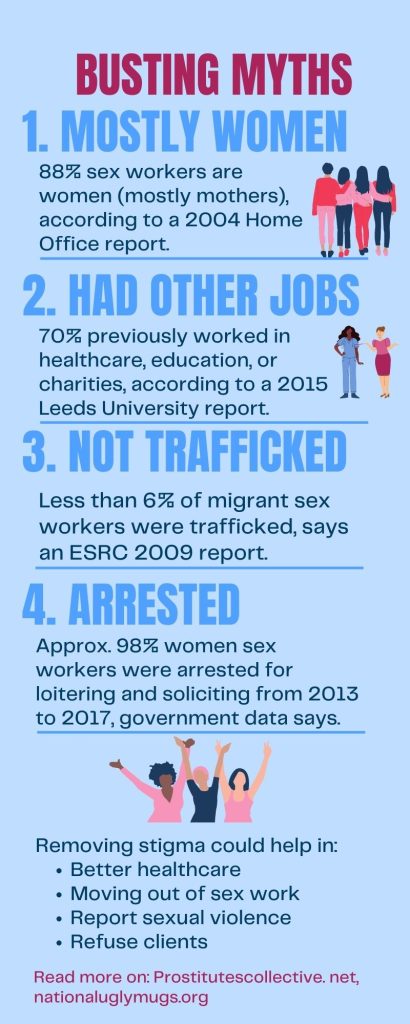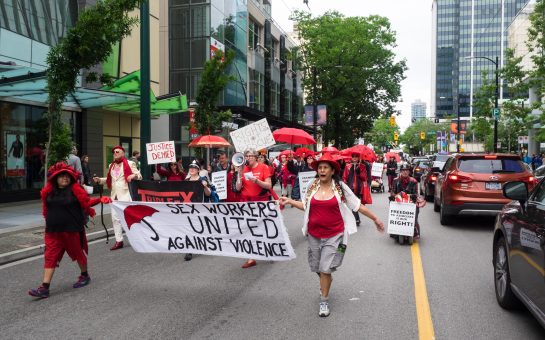Sex workers fear a new bill which could prevent them from advertising online would put their lives in danger if it becomes law.
The Online Safety Bill – spearheaded by MP Nadine Dorries and backed by the Department for Digital, Culture, Media & Sport – would stop sex workers advertising their services online.
Many sex workers use the internet to earn money through webcamming and pornography, as well as to find and vet clients.
And the charity English Collective of Prostitutes (ECP), which work to improve safety for sex workers, fear the new law – Online Safety Bill – would put them in jeopardy.
“They will have to continue working anyway but it will be 10 times more dangerous on the streets. They can’t vet clients,” said ECP spokesperson Laura Watson.
Sex workers can already face violence at the workplace, harassment from police, and in some cases, human trafficking and modern slavery.
The National Policing Sex Work and Prostitution Guidance in 2019 said that moving from street to online sex work has had multiple benefits like increased safety, “less public visibility of the sex working community, and opportunities for organised criminals to profit from exploitation.”
The guidance also says that the police work towards improving the safety of sex workers and “to find practical ways to address crimes against, and exploitation of, those connected to prostitution.”
However, that is far from what happens, Watson said.
Police still turn up at women’s flats, harass and try to criminalise them, she added.
While providing sexual services in exchange for money between two consenting adults is legal in the UK, working together – at a brothel owned by someone or forming a group that looks out for each other – kerb crawling, and “inciting” someone into sex work are still illegal.
Which is why sex workers and charities like ECP want their work to be decriminalised.
In 2019, ECP launched the #makeallwomensafe campaign seeking decriminalisation of sex work, but that is still a distant dream.
They say they face a new threat with the Online Safety Bill, which can take two to three years to come into practice, if passed.
A 2019 report by the University of Bristol estimated that there are 85,714 individuals working as sex workers, including indoor sex workers in the UK.
The number is significant enough for the government to take a second look into their proposed bill because it would mean they would have to go back onto the streets, which is unsafe and can attract a criminal record, instead of finding clients from their homes.
Criminal records make it harder for the people involved to leave the profession—which many say is the oldest profession in the world.
Watson says sex workers are just like other women who face financial issues and these women face destitution or are unable to work and not entitled to benefits.
“It’s a job, the best job in bad jobs,” she said, adding, that if they get a criminal record, it’s hard to leave prostitution even if they want to do care work or go to school.
“Women give up on dreams because of criminal records,” she said.
A Manchester-based sex worker spoke to MancunianMatters on condition of anonymity and a voice actress was used in the interview.
She started sex work in 2018 and lives half an hour away from the city but works in the city center, not exclusively, as a fetish provider.
What do you think about the online safety bill?
What concerns you about the new bill?
Did the pandemic affect your work?
ECP fears the online safety bill could classify adverts as inciting prostitution since the bill can apply to a wide range of situations.
She also said platforms like OnlyFans, which don’t want to get bad press, would take down adverts themselves and the ban would go further than intended.
OnlyFans told MancunianMatters that it supports the Online Safety Bill and already complies with many of its measures.
We are committed to “building the safest and most inclusive digital media platform in the word. It is home to a range of content creators including music artists, comedians, athletes, glamour and adult creators, and more.”
“It is against OnlyFans’ terms of service for creators and fans to use the platform to meet. Creators are prohibited from sharing content that shows, promotes, or refers to escort services,” said the company.
On May 26, Keily Blair, Chief Strategy & Operations Officer of OnlyFans, announced their compliance to the bill that is yet to become law.
“When it comes to account approval, age verification, and content moderation, we should not only rely solely on new technologies.
“Humans can, and should, play a central role in content moderation and account approvals appropriately aided by state-of-the-art technology.
“At OnlyFans, we trust human judgment over algorithms and more than 900 people (which is more than 80% of our employees) play a role in keeping our community safe,” she said.
While that sounds ideal, content moderation comes with problems of its own. OnlyFans has already seesawed over whether they want to ban explicit content or continue to allow it.
There are other platforms, like adultwork.com, and digital tools, like ClientEye and National Ugly Mugs, that sex workers use to keep themselves safe.
The bill can not only dry up the sources of income but the anonymous networks used to ensure safety.
Many people think even if the industry is hidden, there would be no denying its existence, and it wouldn’t necessarily stop it from thriving.
Unfortunately, charities like ECP feel it has already fallen on them to protect themselves, and it remains to be seen how much of their opinion will be taken into account.

Here are some resources for those looking to leave sex work:

